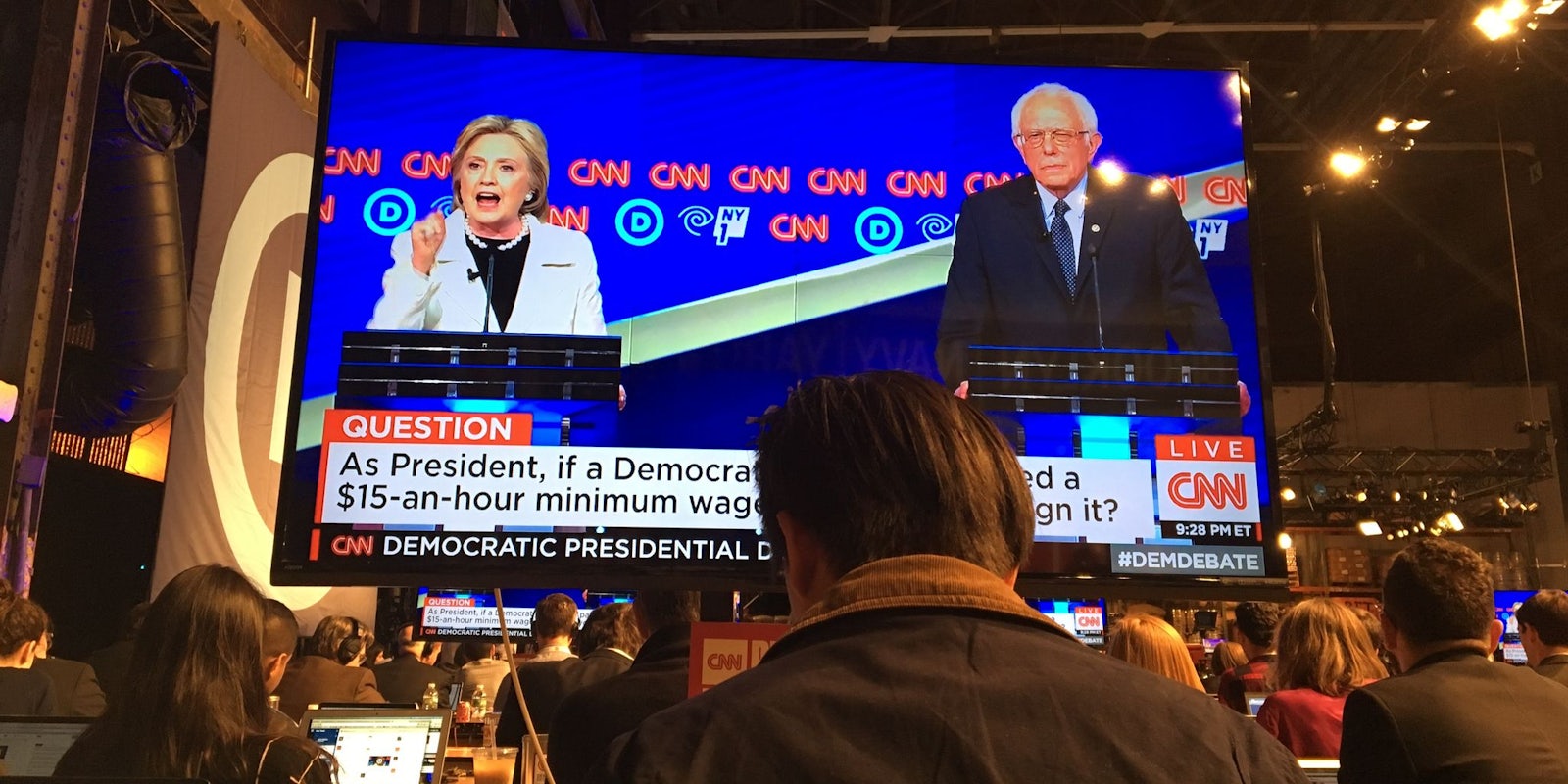If Hillary Clinton and Bernie Sanders are on the same side, you wouldn’t know it from watching Thursday night’s Democratic debate in Brooklyn, New York.
From the first moments of the high-profile event, Sanders and Clinton took off the gloves for a night of bare-knuckle democracy that covered the gamut of issues driving the increasingly heated primary race.
CNN host Wolf Blitzer threw gasoline on the fire from the first question, grilling Sanders over his claims that Clinton—who has served as first lady, two-term U.S. senator from New York, and secretary of state under Obama—lacks the experience to be president of the United States.
“Does Secretary Clinton have the experience and the intelligence to be a president? Of course she does,” Sanders said. “But I do question her judgment.”
After pushing back against Sanders’s claims against Clinton’s judgement, Clinton furthered the argument that Sanders lacks a specific plan to break up major Wall Street banks—a primary aspect of his campaign platform.
Sanders then reiterated his attack against Clinton’s decision to not release the transcripts of her well-paid speeches to Goldman Sachs.
“There are certain expectations when you run for president. This is a new one. And I’ve said, if everybody agrees to do it—because there are speeches for money on the other side. I know that,” Clinton said. “But I will tell you this, there is—there is a long-standing expectation that everybody running release their tax returns, and you can go—you can go to my website and see eight years of tax returns. And I’ve released 30 years of tax returns. And I think every candidate, including Sen. Sanders and Donald Trump, should do the same.”
Sanders pushed back, saying he would begin to release his tax returns on Friday.
One of the biggest moments of the debate came when Sanders claimed that Clinton had refused to support an increase to $15 minimum wage—a criticism Clinton said was simply not true.
Top-Tweeted moment for #DemDebate: Clinton & Sanders discuss raising federal minimum wage to $15/hr https://t.co/DQO3cnLmC2
— Government (@Gov) April 15, 2016
“I have said from the very beginning that I supported the fight for $15. I supported those on the front lines of the fight for—it happens to be true,” Clinton said. “I supported the $15 effort in L.A. I supported in Seattle. I supported it for the fast food workers in New York.”
The candidates then went to the mat over Clinton’s recent statement implying that Vermont’s lax gun regulation contributed to an increase in illegal guns in New York, which heavily regulates firearms. Clinton initially refuted that she meant to imply that Sanders was responsible for gun violence in New York.
“No, of course not,” she said. But she soon walked back on that stance, explaining that guns brought into New York from outside the state are often used in crime.
“Well, the facts are that most of the guns that end up committing crimes in New York come from out of state,” Clinton said. “They come from the states that don’t have kind of serious efforts to control guns that we do in New York.”
Blitzer soon moved the gun conversation onto the topic of mass shootings, like the 2012 Sandy Hook massacre, which Sanders condemned.
“Back in 1988, I ran for the United States Congress one seat in the state of Vermont. I probably lost that election, which I lost by three points, because I was the only candidate running who said, you know what? We should ban assault weapons, not seen them sold or distributed in the United States of America,” Sanders said. “I’ve got a D-minus voting record from the NRA.”
When the candidates moved onto the topic of energy, Sanders accused Clinton of “work[ing] hard to expand fracking to countries all over the world.”
Clinton responded by characterizing Sanders’s criticism as an attack on Obama’s efforts on energy policy.
“…[I]n the face of implacable hostility from the Republicans in Congress, President Obama moved forward on gas mileage, he moved forward on the clean power plant,” Clinton said. “He has moved forward on so many of the fronts that he could given the executive actions that he was able to take.
“It’s easy to diagnose the problem,” Clinton added. “It’s harder to do something about the problem.”
The debate soon entered the thick of foreign policy, covering a wide range of issues, from Libya to Israel. The candidates further got into the thick of it on criminal justice reform, police action, and immigration, to name only a fraction of the topics covered during the two-hour long event.
See how the big issues played out during the #DemDebate https://t.co/nlpNR4pLbQ pic.twitter.com/Xo59cN5PDc
— GoogleTrends (@GoogleTrends) April 15, 2016
Thursday night’s debate comes just days before New York voters take to the polls on April 19. Prior to the debate, Clinton led Sanders by nearly 14 points.


